Kerala Family Grows Their Own Rice & Veggies, Have Not Bought Any in 12 Years
“Last year we were able to cultivate 400 kg of rice, which was a huge win for us. During the rest of the year, we cultivate pulses on that land which usually gives us a yield of 10 kg every year.”
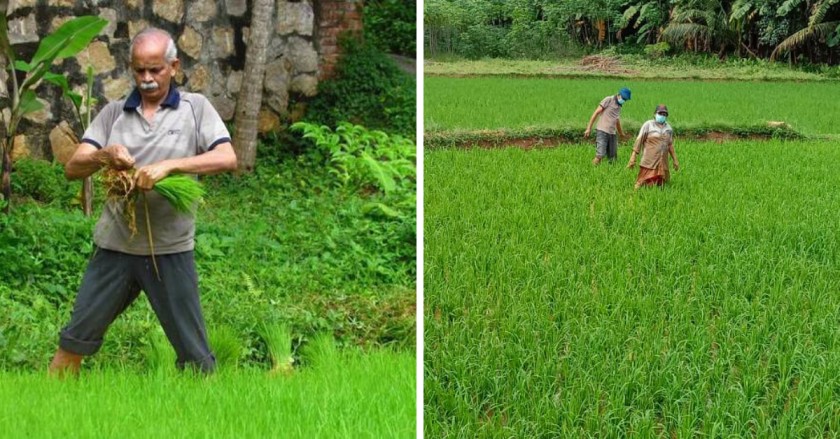
In recent years, there’s been a drastic change in people’s lifestyles. From fast fashion, fast food and fast-paced consumerism, people are now moving towards slower, self-dependent ways of living. As a result, people have started incorporating organic and natural techniques into their lifestyle with a renewed stress on urban gardening and terrace cultivation. Following a sustainable lifestyle, Uma Maheshwaran and his wife, Rajasree, have been cultivating their land for the past 12 years and ensured that their whole family partakes in the farming activities. This family has also adopted the art of self-sustenance as a way of life.
They grow everything they eat — rice or vegetables in their 20-cent plot in Vilavoorkkal, Thiruvanathapuram, Kerala.
“It’s a lot of work to cultivate everything on your own, so besides the help of my family, I ask for help from the Krishi Bhavan nearby for levelling and ploughing the land. Most of the saplings that we’ve cultivated have also been sourced from there,” Uma, 60, a professor at the Vellayani College of Agriculture in the Department of Plant Pathology tells The Better India (TBI).
Rajasree, who works as the Joint Director of Plant Protection at the Directorate of Agriculture, Thiruvanathapuram says, “Last year we were able to cultivate 400 kg of rice, which was a huge win for us. Paddy cultivation takes only upto 3-4 months and is harvested mostly in November. During the rest of the year, we cultivate pulses on that land which usually gives us a yield of 10 kg every year.”
Uma & Family Grow Their Food
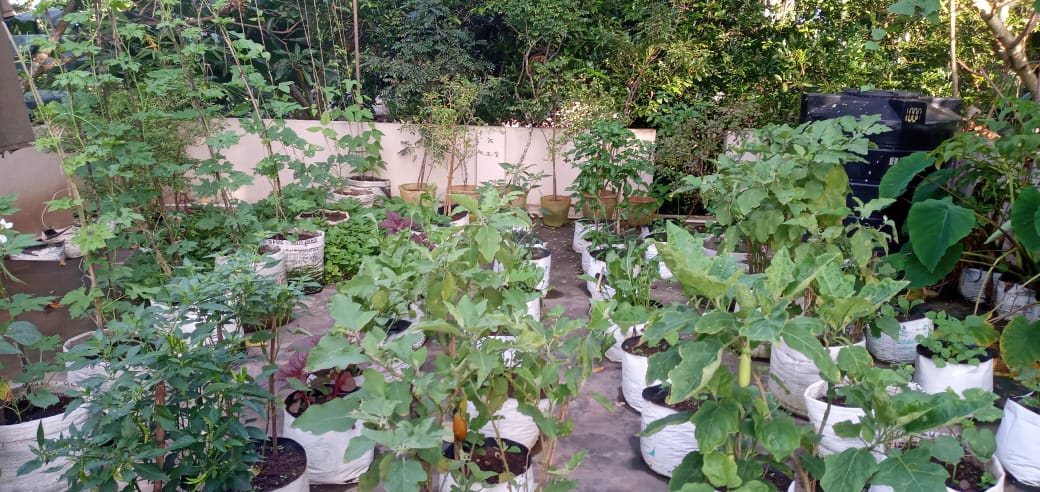
The family cultivates paddy in 20 cents of land and in the 6 cents surrounding their house, they grow essential spices like ginger, turmeric, pepper and vegetables like tomatoes, ladies finger, green chillies, cauliflower, along with bananas.
“Besides vegetables like potatoes and onions, potatoes and garlic, which tend to grow in cooler regions, we grow everything — tomato, brinjal, bitter gourd, beans, ladies finger, tapioca and local tubers like chena and chembu. The plants that are kept on the terrace are cultivated using grow bags,” Uma explains.
Uma’s son Anand U, a banker based in Thrissur has also been involved in the farming process from his childhood and has imbibed a keen interest for it from his parents.
Talking to TBI, Anand says, “It’s become a way of life for us, and even while I’m working a 9-5 job now, it’s nice to come home on holidays and help out in the fields. Subsistence farming is something that every family in the country can easily adopt. Especially with the current scenario of COVID-19, it has become a safer and healthier option for us to grow our crops.”
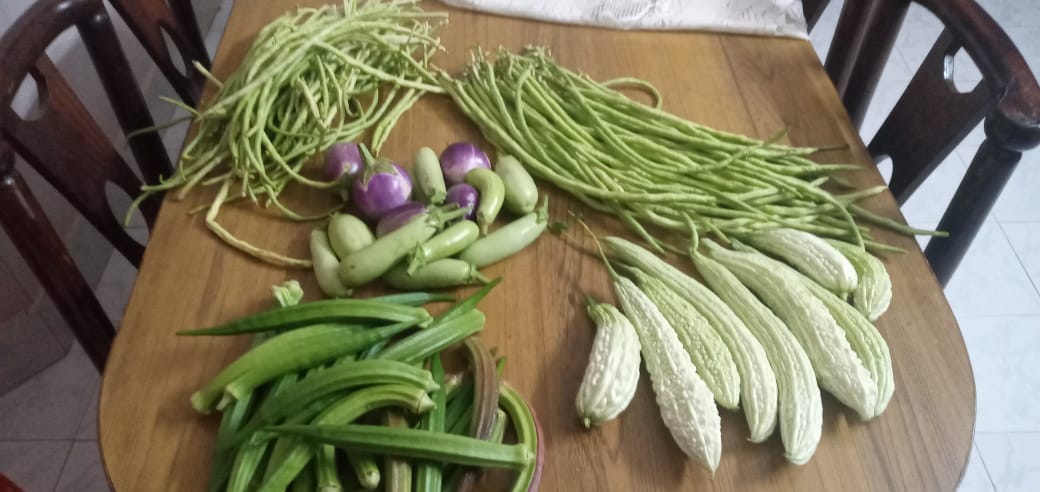
Now Anand’s wife Aparna, who recently joined the family, has also taken on farming with a lot of enthusiasm.
“Aparna didn’t have any prior farming background, but she picked it up within weeks while we were at home in Thiruvananthapuram. It may seem difficult in the beginning, but it is one of the simplest things and helps you save up on a lot of grocery money,” Anand adds.
Happy Neighbours, Happy Planet
We talked to Chitra Sasisdharan, a homemaker in Uma’s neighbourhood who says, “I’ve always been very astonished by the dedication Rajasree and Uma have shown towards agriculture. They wake up every day at 4.30 a.m. to weed the paddy fields and water their plants before heading off to work. The couple has also been very generous by giving a portion of their harvest to us every year.”
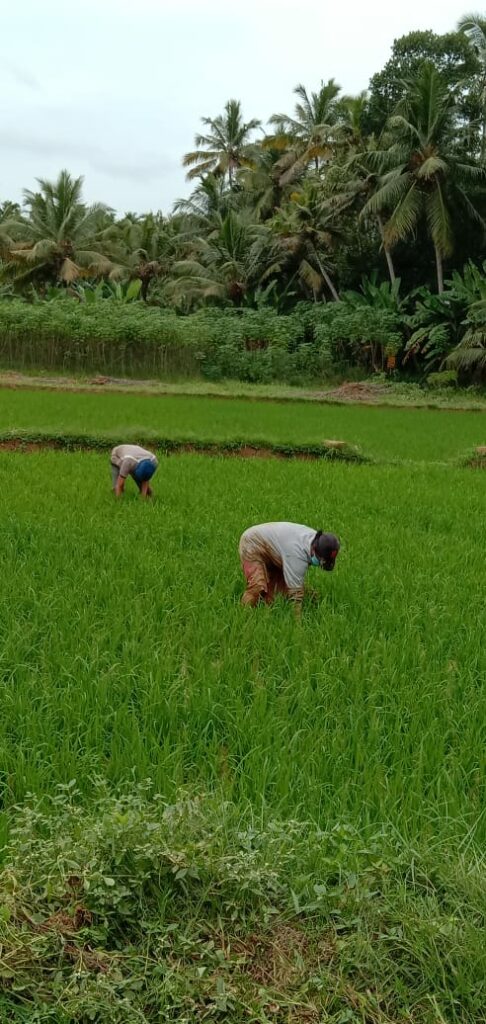
The plastic usage in Uma’s house has also come down with lesser products being brought from the market. “We have also seen a drastic dip in the plastic carry bags brought back to our house. Besides plastic packaged snacks, we don’t seem to have any kind of excess plastic lying around the house,” explains Rajasree.
As for their irrigation needs, the couple source water from a shared pond in the panchayat through a pump. This was set up by the panchayat to help all the farmers in the area.
Apiculture & More
The family has recently started trying their hands on apiculture to produce honey for the family and to help with the cross-pollination of their terrace crops. They have also set up vermicompost to collect biowaste from the kitchen to use as an organic fertiliser for the plants.
“A lot of seasonal pests come to attack the crops but never once have we resorted to chemical fertilisers and pesticides. That would defeat the entire purpose of our cultivation. Instead, we use organic pesticides made from garlic and neem and the vermicompost as a fertiliser,” says Uma.
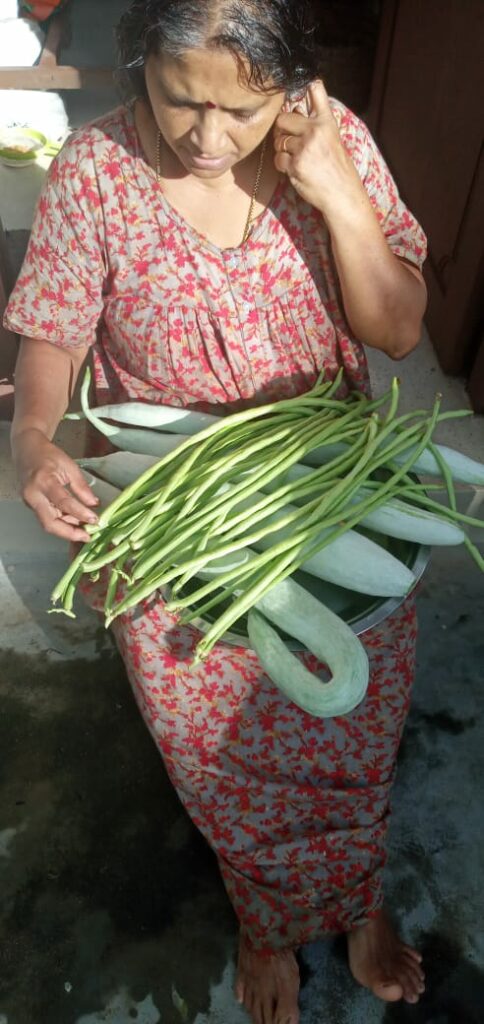
In the present scenario of COVID-19, adopting Uma and Rajasree’s cultivation method would be highly beneficial to Indian homes in terms of health, safety and accessibility. In the coming future, this concept in agriculture is undoubtedly something we will move towards.
Picture Source: Uma Maheshwaran
(Edited by Saiqua Sultan)
If you found our stories insightful, informative, or even just enjoyable, we invite you to consider making a voluntary payment to support the work we do at The Better India. Your contribution helps us continue producing quality content that educates, inspires, and drives positive change.
Choose one of the payment options below for your contribution-
By paying for the stories you value, you directly contribute to sustaining our efforts focused on making a difference in the world. Together, let’s ensure that impactful stories continue to be told and shared, enriching lives and communities alike.
Thank you for your support. Here are some frequently asked questions you might find helpful to know why you are contributing?


This story made me
- 97
- 121
- 89
- 167











